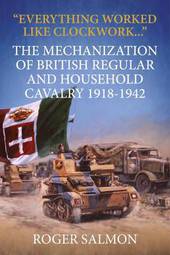
|
"Everything Worked Like Clockwork...": The Mechanization of British Regular and Household Cavalry 1918-1942
Hardback
Main Details
| Title |
"Everything Worked Like Clockwork...": The Mechanization of British Regular and Household Cavalry 1918-1942
|
| Authors and Contributors |
By (author) Roger Salmon
|
| Series | Wolverhampton Military Studies |
|---|
| Physical Properties |
| Format:Hardback | | Pages:328 | | Dimensions(mm): Height 234,Width 156 |
|
| Category/Genre | British and Irish History
Military history |
|---|
| ISBN/Barcode |
9781910777961
|
| Classifications | Dewey:358.18094109042 |
|---|
| Audience | | Professional & Vocational | |
|---|
| Illustrations |
c 50 b/w photosc 50 b/w photos
|
|
Publishing Details |
| Publisher |
Helion & Company
|
| Imprint |
Helion & Company
|
| Publication Date |
15 July 2016 |
| Publication Country |
United Kingdom
|
Description
The mechanization of British and Household Cavalry regiments took place between the two World Wars and on into 1942. This book describes the process by which many horsed cavalrymen were re-trained to operate and fight in Armoured Fighting Vehicles (AFVs) and the experiences of some of the men and regiments involved. Extensive use has been made of regimental and War Office archives, and particularly from the Imperial War Museum's sound archives - the oral testimonies of soldiers who had experienced this huge change. A small number of veterans are, or were, still living and were interviewed by the author for this work. The reason given for the delay in cavalry mechanization - cited in some military histories and much influenced by the writings of Sir Basil Liddell Hart - was the reluctance by the cavalrymen to part with their horses and their technophobic attitude. This book tests the accuracy of this assertion, together with what was the availability of suitable and sufficient armoured fighting vehicles to replace the cavalry's horses. Of special interest is the examination of the historical papers of the tank manufacturers Vickers, held at the Cambridge University Library, regarding tank development and production. This story of mechanising the cavalry has been set against the backdrop of the social, economic and political climate of the 1920s and 1930s, and the pressure on politicians of the wider franchise and public opinion. In researching this aspect, the Britain by Mass Observation archives - held at the University of Sussex - have been most illuminating. The interwar impact on cavalry mechanization; the role of the British Army in general; disarmament; and rearmament are described - again with illustrations from oral testimonies.
Author Biography
Roger Salmon, the son of an interwar cavalry soldier, spent his working life (from 1962) in management and leadership in an industrial environment during an era when many technological and cultural changes were demanded. Retiring early from a successful business career to indulge his own passion for horses and riding - and to formally study Military History - he was curious about the process undertaken by the army to mechanise horsed cavalry. Little of consequence had been researched. Soon after embarking on finding and interviewing veteran cavalrymen, it became clear to Salmon that what little that had been written might not be either accurate or perhaps somewhat selective in explanation. Having achieved a First Class Honours Degree in War Studies at the University of Birmingham, Salmon was invited to research the subject of cavalry mechanization first at Birmingham and subsequently at the University of Wolverhampton, where he was awarded a PhD in 2014. Dr Salmon has published a number of articles on different aspects of military history. He lives in Essex and has three children and a granddaughter. He is a member of The Royal United Services Institute and The British Commission for Military History; a Freeman of the City of London; a Past Master of the Worshipful Company of Launderers; and a Member of the Order of St John of Jerusalem.
ReviewsThis is very much a labour of love for Roger Salmon who has produced an in depth treatise based on actual documents, interviews with veterans and compares them with previous published works. * Scale Military Modelling International Magazine * Comprehensive, engagingly written and well researched, this book is particularly recommended; and as usual, plaudits to Helion for making another excellent example of British military historical research available at an accessible price. * Society of Friends of the National Army Museum * The bulk of the book describes well the policy arguments and technical debates prevailing in the army, industry, the Government, and amongst the public at large. * Miniature Wargames - Chris Jarvis * "This is an important book not just for cavalry mechanization but for British defence policy in the inter-war years.." * Dr Stephen Badsey * It is difficult to find fault with this thoroughly readable and informative book, which will appeal to a wide audience. * Journal of the Society of Army Historical Research *
|